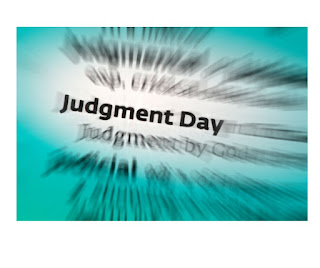Judgement Day
“Judge not, that you be not judged.
For with what judgment you judge, you shall be judged…”
Our lesson this week will consider the practical implications of that infamous saying offered in Matthew 7:1-2.
Like most of us, I came to understand this to mean that as I judged others harshly, GOD would judge me harshly in return. This stems from the teaching of a literal ‘judgement day’ whereby our eternal future will be decided, for better or worse..
What many of us love about Unity is that it offers us access to be able to apply spiritual understanding in the here and now.
Consider the metaphysical interpretation of the 'Last Judgement" as described in The Metaphysical Bible Dictionary by Unity Co-Founder, Charles Fillmore:
“The description of the Last Judgment, as given in the Gospels, has been used to terrify men and women and thus compel them to unite with the church; but in this day of enlightenment people are not so easily led or driven by fear. They ask for understanding. When they seek light concerning the judgment it is given, and they learn that the judgment is all a matter of divine law. They find that for every departure from this law they suffer, not in some future time of great tribulation, not in a great judgment after death, but in this life--here and now."
Jesus is actually teaching us something about the quality of our judgements rather than threatening us with the wrath of a judgmental God.
Rev. Linda Martella-Whitsett writes, “Read allegorically, which many Bible scholars and metaphysicians endorse, this is our call to integrity in our expression of judgement” (Divine Audacity, page 139).
In reality, we use our judgement faculty all of the time, in order to evaluate our options and make wise choices. It is our propensity to be pass judgement that this lesson really points out. When we evaluate our own worth or that of others through the process of comparison and evaluation, the question then becomes what standard are we using for such evaluations?
Working toward that higher understanding reveals our human tendency to make judgements based on the more superficial aspects of our experience. We can also see how our social, cultural and religious norms influence our perception of what is ‘good’ or who is ‘worthy’ which are then reflected in our own judgements.
The lesson deepens when we consider another aspect of this teaching from the Gospel of John, “Judge not by appearance, but judge righteous judgement” (John 7:24).
Eric Butterworth explains this by saying,
“In other words, don’t be misled by the façade, by the personality or superficiality of yourself or others. There is always that of you that is greater than your littleness, stronger than your weakness, wiser than your follies, better than your deeds" (Butterworth, Discover the Power Within, pg. 52).
Righteousness his another concept that has often been misunderstood and misapplied.
“Righteousness to Jesus meant the actual practice in thought of one’s essential spiritual unity with God. It is the right-use of spiritual law... to think rightly [is] to practice the presence of God…” (Butterworth, Discover the Power Within, pg. 134).
“In other words, don’t be misled by the façade, by the personality or superficiality of yourself or others. There is always that of you that is greater than your littleness, stronger than your weakness, wiser than your follies, better than your deeds" (Butterworth, Discover the Power Within, pg. 52).
Righteousness his another concept that has often been misunderstood and misapplied.
“Righteousness to Jesus meant the actual practice in thought of one’s essential spiritual unity with God. It is the right-use of spiritual law... to think rightly [is] to practice the presence of God…” (Butterworth, Discover the Power Within, pg. 134).
This is ultimately an invitation to realize a greater depth of God within us, and use our judgement and discernment faculty from the depth of that realization. That is to say that w can grow our capacity to know the fullness of ourselves in God, rather than to limit ourselves, and others to the temporary things and conditions of this world. Otherwise, we do indeed reap what we sow in the field of our limited judgements.

.jpg)

Comments
Post a Comment